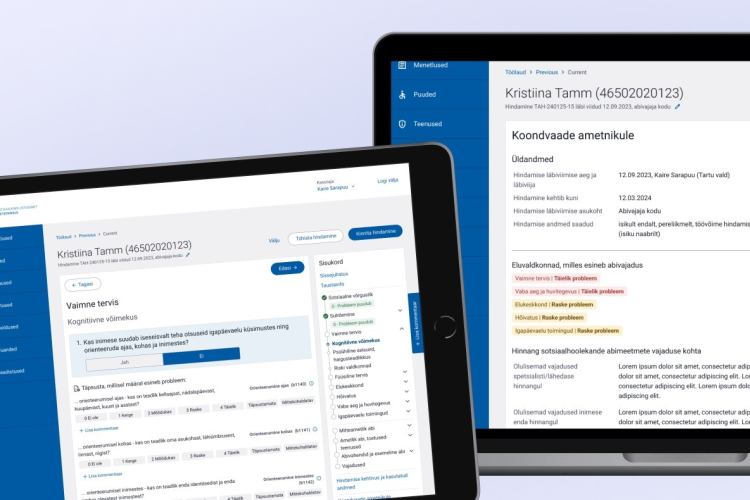Drupal – a powerful alternative to WordPress for more complex web projects
When should you develop a web solution in Drupal, and when is it better to choose another framework? We discussed this with our Drupal development team — looking at Drupal’s advantages compared to WordPress and other frameworks, the situations where other platforms might be a better choice, and some of the most common misconceptions about Drupal.
To be clear, we don’t consider WordPress or any other platform inferior, but choosing the right platform always depends on the specific needs of the project.
Trinidad Wiseman’s Drupal developers Mairo Aljaste, Ragnar Punak both also has extensive WordPress and Laravel experience), Egon Tinno, and business developer Peeter Ossip share their insights. On average, our Rakvere-based Drupal team has 14 years of experience, with hundreds of successfully delivered projects.
At Trinidad Wiseman, we provide web development on all major platforms. Within our team, we build Drupal-based websites ranging from simple information sites to self-service environments and custom solutions with complex integrations. You can read more about our Drupal development services on our website and contact us to discuss your business needs.
What are the advantages of Drupal in web development?
Drupal is a content management framework built on top of the Symfony PHP framework. It provides both a solid foundation for web projects and a wide range of building blocks for creating everything from small websites to complex web services. Drupal is often chosen for enterprise-level and complex websites because of its flexibility, security, and reliability.
Some key advantages include:
- Greater built-in functionality – One of Drupal’s main strengths is the wide and compatible set of features included in the core solution. In WordPress, the same functionality usually requires additional (often paid) plugins. The more third-party plugins a website uses, the more its performance and security are at risk.
- Built-in configuration management – Drupal’s configuration management system makes it possible to automate changes across different environments (local, test, pre-live, and live). This simplifies developers’ work, saves time, and reduces errors.
- Standardized development rules – Drupal is built on the Symfony PHP framework, which enforces a clear development structure. Standardization is further supported by templates (Themes and Twig) that define the site’s visual appearance and help keep the code consistent and clean. Well-structured code is faster, more secure, easier to read, and makes it simpler to onboard new developers.
By contrast, WordPress has no comparable built-in framework, and coding standards depend entirely on the development team. While this gives developers more freedom, it can also make it difficult to maintain consistency in long-term projects — especially when multiple developers are involved. Complex WordPress sites with many plugins can easily turn into a “house of cards.”
- Security – Drupal’s security is supported both by standardized coding practices and by flexible user-rights management. Drupal allows administrators to create custom roles and assign detailed permissions. WordPress, by default, relies on predefined roles with fixed permissions, and more granular control usually requires a plugin. When it comes to plugins, WordPress security largely depends on the plugin developer. The WordPress security team intervenes mainly for plugins in the official WordPress.org directory.
In contrast, Drupal has a formal security policy and labeling system. Modules in the official Drupal.org repository marked with ‘Security Advisory Coverage’ fall under the Drupal Security Team’s oversight and receive coordinated security advisories if vulnerabilities are found. While neither platform pre-checks every extension, Drupal’s security process is more formal and structured, whereas WordPress security relies more heavily on individual developers and the community.
- Greater flexibility – Drupal is more than just a CMS — it’s a content framework. This gives developers greater freedom to build custom solutions. Unlike WordPress, Drupal makes it easy to create new content types and management views with additional modules, allowing for powerful and customizable admin interfaces. This is especially useful for websites with diverse content types that require different management needs.
- Multilingual support – In regions like ours, where multilingual websites are standard, Drupal’s built-in multilingual features are a major advantage. For example, we have developed multilingual websites, including right-to-left languages such as Arabic and Pashto. WordPress, in comparison, requires third-party (often paid) plugins for multilingual support.
When to choose Drupal, and when to use other technologies?
WordPress’s strength lies in its abundance of developers and ready-made design templates, making it the fastest and most affordable solution for simple websites. However, when working with a custom design, the cost difference between WordPress and Drupal development is usually minimal.
Drupal shines with complex web solutions, where WordPress would require many plugins to achieve the same functionality — slowing the site and increasing maintenance risks. With Drupal’s built-in features, developers can save time by using existing components rather than building everything from scratch.
In the long run, managing a complex website in Drupal is often more cost-effective than in WordPress. Drupal is also the preferred choice for teams with multiple developers, as it helps maintain a unified and consistent codebase.
When is Drupal not enough?
That said, there are cases where Drupal isn’t the best fit. For highly complex information systems requiring maximum flexibility, frameworks like Laravel (PHP), Node.js (JavaScript), or Spring (Java) may be more suitable. These solutions require building both the architecture and codebase from scratch, which takes more time, but may be worth it if CMS functionality is unnecessary or limiting.
It’s important to note that a website’s complexity isn’t defined by size (e.g., number of images) but by its functionalities and integrations. For example, the more content types, management rules, and external system integrations a site requires, the more complex it becomes. By comparison, an average informational site typically contains 5–10 content pages.
To summarize:
- For small information sites, WordPress is often the quickest and most convenient choice.
- For e-shops, specialized platforms like Adobe Commerce (Magento) may be more suitable than Drupal.
- For external websites, subscription services, self-service portals, and custom intranets, Drupal is an excellent fit. (For example, Trinidad Wiseman’s own website is built on Drupal.)
- For less complex intranet implementations, Confluence could be a faster and more efficient option due to its out-of-the-box functionality.
- For very specific, tailor-made web solutions or complex information systems, frameworks such as Laravel (PHP), Node.js, or Java-based frameworks like Spring may be more appropriate.
Common misconceptions about Drupal
Based on our experience, we’d also like to dispel a few common misconceptions about Drupal:
“Drupal developers are hard to find.”
It may seem this way compared to WordPress, but this is partly because many people call themselves “WordPress developers” with widely varying skill levels — sometimes limited to setting up simple sites. Skilled Drupal developers are available, but the label is used more carefully.
“Managing a Drupal website is complicated.”
Another frequent concern is that Drupal websites are difficult for content editors to manage. In reality, our clients’ transitions from WordPress to Drupal have gone smoothly.
Drupal’s flexibility allows us to customize the admin interface for convenience. We also support clients with user training and clear manuals to ensure smooth onboarding.
While WordPress’s admin interface was once more visually polished, Drupal has since caught up. Similarly, WordPress used to have the edge with its media manager, but Drupal has made major strides in usability here as well.
Conclusion
Drupal provides a strong foundation and a wide range of building blocks for creating web solutions that are scalable, secure, and future-proof.
While WordPress is often the fastest choice for simple websites, and Laravel, Java, or Node.js are better suited for complex information systems, Drupal remains an excellent option for larger organizations’ external websites, subscription services, self-service environments, and other advanced digital platforms.
Read more about our Drupal team’s projects.







